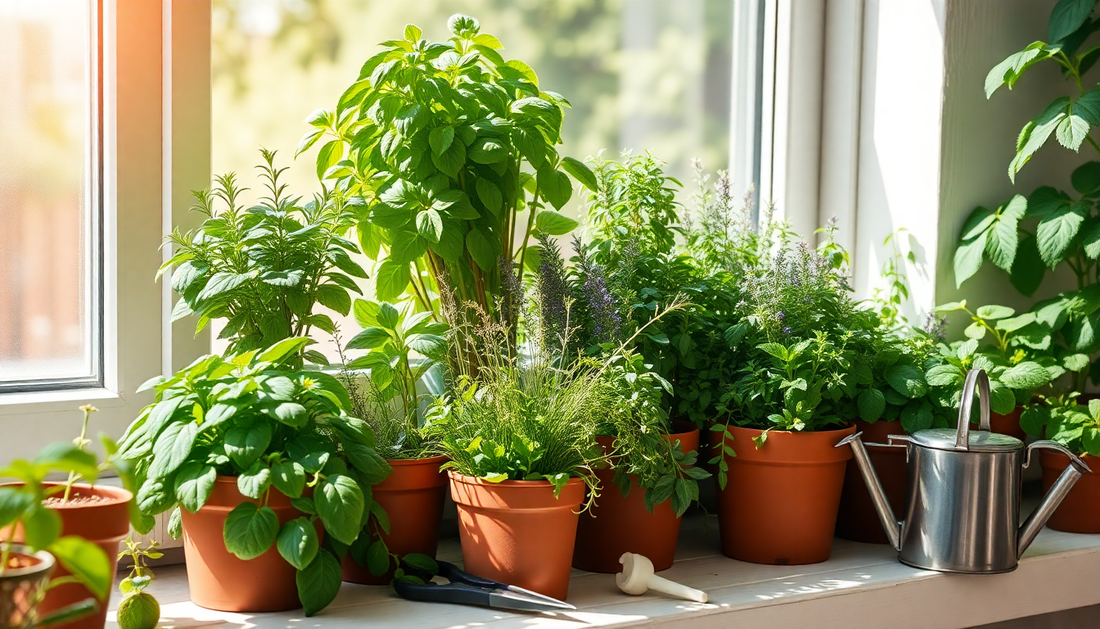
Cultivating Culinary Delights: A Guide to Growing Herbs in Small Spaces
Share
In the bustling city of Bangalore, where space is at a premium, the desire to nurture a thriving garden can seem like a distant dream. However, with the right approach and a little creativity, even the most compact of living spaces can become a haven for fragrant, flavorful herbs. Welcome to Idyl, your one-stop-shop for all your gardening needs, where we're here to share our expertise and inspire you to transform your small space into a flourishing herb oasis.
The Joy of Herb Gardening
Herbs are the unsung heroes of the culinary world, adding depth, aroma, and a touch of magic to our favorite dishes. Whether you're a seasoned home chef or a budding culinary enthusiast, incorporating fresh herbs into your cooking can elevate your meals to new heights. Beyond their gastronomic benefits, herbs also offer a wealth of therapeutic properties, making them a valuable addition to any home.
Cultivating your own herb garden, even in a limited space, can be a deeply rewarding experience. The act of nurturing these fragrant plants, watching them grow, and then harvesting their leaves to infuse your dishes with their unique flavors is a true joy. It's a connection to nature that can bring a sense of calm and mindfulness to your daily routine.
Choosing the Right Herbs for Small Spaces
When it comes to growing herbs in small spaces, the key is to select varieties that thrive in confined environments. Some of the best options include:
Basil
Fragrant and versatile, basil is a staple in many cuisines. It thrives in well-drained soil and requires ample sunlight, making it an excellent choice for windowsill or balcony gardens.
Mint
Refreshing and prolific, mint is a hardy herb that can flourish in containers or even hanging baskets. Just be mindful of its tendency to spread, and consider planting it in a dedicated pot.
Rosemary
With its distinctive pine-like aroma and flavor, rosemary is a Mediterranean herb that adapts well to small-space gardening. It prefers well-draining soil and plenty of sunlight.
Thyme
Compact and resilient, thyme is a wonderful choice for herb gardens in limited spaces. It thrives in full sun and can even tolerate partial shade.
Chives
These delicate, onion-flavored herbs are perfect for container gardening. They require minimal maintenance and can even be grown indoors on a sunny windowsill.
When selecting your herbs, consider their mature size, light and water requirements, and compatibility with your living environment. Idyl's team of gardening experts can provide personalized recommendations to help you choose the best herbs for your small space.
Preparing Your Herb Garden
Before you start planting, it's essential to ensure that your small space is well-suited for herb cultivation. Here are some tips to get you started:
Choosing the Right Containers
Herbs thrive in well-draining containers, such as terracotta pots, wooden planters, or even repurposed household items like old buckets or crates. Make sure your containers have adequate drainage holes to prevent waterlogging.
Selecting the Ideal Soil
Use a high-quality, well-draining potting mix specifically formulated for herbs. Avoid using regular garden soil, as it may be too dense and heavy for container gardening.
Ensuring Proper Sunlight
Most herbs require at least six hours of direct sunlight per day. Carefully consider the placement of your herb garden to maximize exposure to natural light, whether it's on a sunny windowsill, balcony, or patio.
Implementing a Watering Schedule
Herbs have varying water needs, so it's essential to establish a consistent watering routine. Avoid overwatering, as this can lead to root rot, and be mindful of the soil's moisture levels.
Caring for Your Herb Garden
Maintaining a thriving herb garden in a small space requires a bit of attention and care, but the rewards are well worth it. Here are some tips to help your herbs thrive:
Pruning and Harvesting
Regular pruning and harvesting are essential for the continued growth and productivity of your herbs. Snip off the leaves or stems as needed, taking care not to remove more than a third of the plant at a time.
Fertilizing
Herbs are light feeders, but they do benefit from the occasional application of a balanced, organic fertilizer. Avoid over-fertilizing, as this can lead to excessive foliage growth at the expense of flavor.
Pest and Disease Management
Keep an eye out for common herb pests, such as aphids or spider mites, and address any issues promptly. Organic pest control methods, like introducing beneficial insects or using neem oil, can be effective.
Rotation and Companion Planting
To maintain the health and productivity of your herb garden, consider rotating your plants and incorporating companion planting techniques. This can help deter pests, improve soil fertility, and maximize the use of your limited space.
Culinary Inspirations and Beyond
As you nurture your herb garden, the possibilities for culinary exploration are endless. Incorporate your freshly harvested herbs into a wide range of dishes, from fragrant pesto and zesty salad dressings to aromatic teas and infused cocktails.
Beyond the kitchen, herbs can also be used for their therapeutic properties. Certain varieties, such as lavender and chamomile, are known for their calming and soothing effects, making them a valuable addition to your self-care routine.
At Idyl, we're passionate about helping you unlock the full potential of your small-space herb garden. Our team of gardening experts is here to provide personalized guidance, from plant selection to ongoing maintenance. Whether you're a seasoned green thumb or a novice gardener, we're committed to empowering you to cultivate your own culinary delights and reap the benefits of herb gardening in your compact living space.
So, what are you waiting for? Embark on your herb-growing journey with Idyl and let your small space blossom with the vibrant flavors and aromas of a thriving herb garden.
